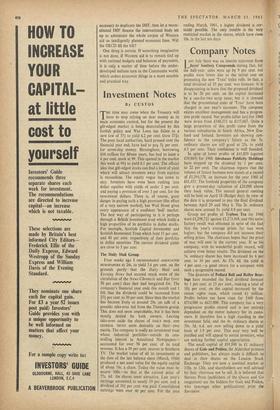Investment Notes
By CUSTOS
THE time may come when the Treasury will have to stop relying- on dear money as its main economic control, but for the present the gilt-edged market is being demoralised by this foolish policy and War Loan has fallen to a new low of 571 to yield 6.2 per cent. (now 571). The poor local authorities, hard pressed over the financial year end, have had to pay 51 per cent. for seven-day money. Birmingham, borrowing £10 million for fifteen years, has had to issue a 6 per cent. stock at 99. This opened in the market this week at 991 to yield 6.1 per cent. The official idea that gilt-edged stocks can, find a level of yield which will attract investors away from equities is moonshine. The equity vogue has come to stay. Investors have even been rushing into dollar equities with yields of under 2 per cent. and paying a premium of over 5 per cent. for the investment dollars. There is, of course, great danger in paying such a high premium (the effect of a very narrow market), but Wall Street gives every appearance of a confident 'bull' market. The best way of participating in it is perhaps through a British investment trust which holds -a high proportion of its portfolio in dollar stocks. For example, Scottish Capital Investment and Scottish Investment Trust which hold 35 per cent. and 40 per cent. respectively of their portfolio in dollar securities. The current dividend yields are close to 3 per cent.
The Daily Mail Group
Four weeks ago I recommended ASSOCIATED NEWSPAPERS aft 24s. to yield 5.6 per cent. on the grounds partly that the Daily Mail and Evening News had secured much more of the circulation of the News Chronicle and Star (over 50 per cent.) than they had bargained for. The company's financial year ends this month and .1 felt that the dividend could be increased from 274 per cent. to 30 per cent. Since then the market has become lively at around 29s. on talk of a possible take-over bid from the Thomson group. This does not seem improbable, but it has been stoutly denied by both owners. Leaving take-over aside the shares of DAILY MAIL AND GENERAL TRUST seem desirable on their own merits. The company is really an investment trust whose industrial portfolio—outside its con- trolling interest in Associated Newspapers— accounted for over 50 per cent. of its total revenue. It has a 30 per cent. interest in Southern TV. The market value of all its investments at the date of the last balance sheet (March, 1960) produced a net asset value for the equity capital of about 74s. a share. Today the value must be nearer 100s.—so that at the current price of 77s. 6d. the shares seem attractive. Last year's earnings amounted to nearly 19 per cent. and a dividend of 161 per cent. was paid. Consolidated earnings were over 40 per cent. For the year ending March, 1961, a higher dividend is cer- tainly possible. The only trouble is the very restricted market in the shares, which have risen 10s. in the last ten days.


































 Previous page
Previous page